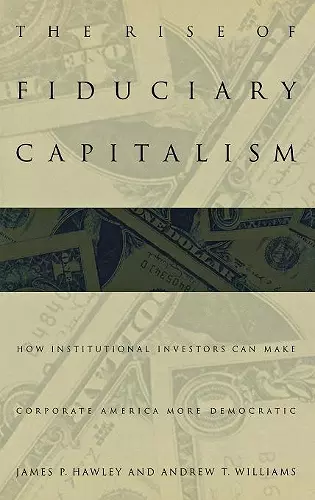The Rise of Fiduciary Capitalism
How Institutional Investors Can Make Corporate America More Democratic
James P Hawley author Andrew T Williams author
Format:Hardback
Publisher:University of Pennsylvania Press
Currently unavailable, and unfortunately no date known when it will be back

Traces the rise of public and private pension funds, which now control as much as 50 percent of the equity in American corporations, and argues that shareholders in those funds could use their power to make corporations more responsive to social needs.
At the beginning of the twenty-first century, the structure of corporate ownership is undergoing major change. The Rise of Fiduciary Capitalism chronicles the rise of fiduciary institutions—primarily public and private pension funds—which now own almost 50 percent of the equity of American corporations. In turn, approximately 50 percent of Americans either own stock individually or, more typically, have an ownership or retirement interest in these fiduciary institutions.
James P. Hawley and Andrew T. Williams argue that, because of their extensive diversification of ownership, fiduciary institutions have become "universal owners" with a significant stake in a broad cross-section of the largest publicly traded firms in the economy. Forced to evaluate portfolio-wide effects of individual firm actions, these institutions have a quasipublic policy interest in the long-term health and wellbeing of the whole society. As universal owners, fiduciary institutions are in a unique position to develop and pursue policies of virtuous efficiency, minimizing negative externalities and encouraging positive outcomes by the firms in their portfolios. In this way, they have the potential to make the firms in which they own stock more responsive to the needs of the Americans to whom they are responsible and thereby make those firms more democratic.
The Rise of Fiduciary Capitalism investigates the nature of property and ownership in the modern corporate setting, the effects of the decline of traditional, personally held property in equity form, and the governance implications of the developing new form of corporate ownership.
"The book is heartily recommended, particularly to pension fund managers and trustees and to corporate observers in general." * Enterprise and Society *
ISBN: 9780812235630
Dimensions: unknown
Weight: unknown
256 pages